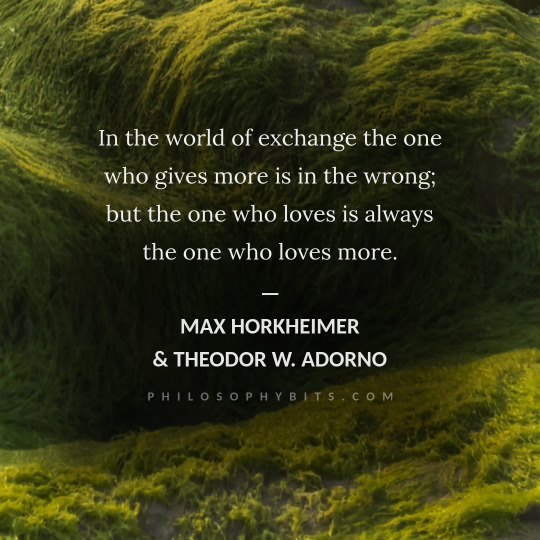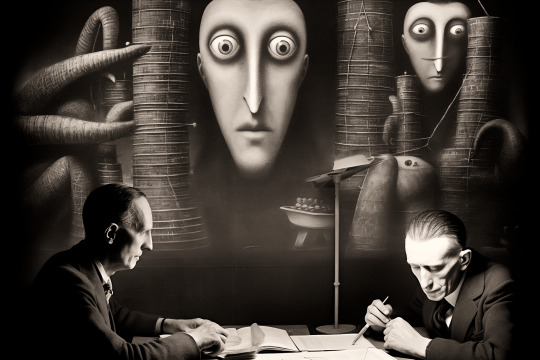#Dialectic of Enlightenment
Quote
The more complex and sensitive the social, economic, and scientific mechanism, to the operation of which the system of production has long since attuned the body, the more impoverished are the experiences of which the body is capable.
Max Horkheimer & Theodor W. Adorno, Dialectic of Enlightenment
#philosophy#quotes#Max Horkheimer & Theodor W. Adorno#Dialectic of Enlightenment#mechanism#machines#experience#instrumentalism#capitalism
77 notes
·
View notes
Text
“On the way from mythology to logistics thought has lost the element of self-reflection and today machinery disables men even as it nurtures them.”
- Adorno/Horkheimer
#frankfurt school#quotes#philosophy#civilization#german#theodore adorno#dialectic of enlightenment#max horkheimer#caution#dangerous#culture creation#how to control the mass of society
56 notes
·
View notes
Text

Wissenschaftsgeschichte und Dialektik der Aufklärung I [History of Science and the Dialectic of the Enlihghtenment II], 8
Follow me, — says Visual Ratatosk
#history of science#Dialectic of Enlightenment#AI#generative#generative art#ai art#Midjourney#neurophotography#promptography#collective memories#vintage style#retro style#diffusion models#neuroart#neurohistory#generative Kunst#KI-Kunst#kollektive Erinnerungen#Vintage-Stil#Retro-Stil#Diffusionsmodelle#künstliche Intelligenz#generativo#arte generativo#arte de IA
7 notes
·
View notes
Text

#philosophy#quotes#Max Horkheimer & Theodor W. Adorno#Dialectic of Enlightenment#Adorno#commerce#trade#giving#love#capitalism
7 notes
·
View notes
Text
Only those who subject themselves utterly pass muster with the gods. The awakening of the subject is bought with the recognition of power as the principle of all relationships. In face of the unity of such reason the distinction between God and man is reduced to an irrelevance, as reason has steadfastly indicated since the earliest critique of Homer. In their mastery of nature, the creative God and the ordering mind are alike. Man's likeness to God consists in sovereignty over existence, in the lordly gaze, in the command.
Adorno & Horkheimer, Dialectic of Enlightenment (transl. E. Jephcott
#that part in dziady by mickievicz where konrad compares his writing to god's creation and tells him ''i feel and create immortality. and#you; god; what more could you do?'' but it's about science not literature this time#lmao#dialectic of enlightenment
13 notes
·
View notes
Text
New substack about the nature of female rage, anorexia, and any dunne 💖
#gone girl#Amy dunne#Theodore Adorno#dialectic of enlightenment#Camille paglia#osamu dazai#Anne Sexton#Arthur Rimbaud#iphigenia#medea#Gillian Flynn#soren kierkegaard#basically tagging the authors I quoted
9 notes
·
View notes
Text
2 November 2023,
The rejection of emptiness, failure to reflect upon emptiness and the negation of awakening (the process of becoming conscious) are a few downfalls in the grasping of/ attainment of enlightenment.
#philosophy#oriental philosophy#tagitables#basically so#ontology#metaphysics#existentialism#dialectic of enlightenment
0 notes
Text
I know that “old man claims movies are so stupid nowadays” is like an omnipresent sentiment but this quote rules
Amusement under late capitalism is the prolongation of work. It is sought after as an escape from the mechanized work process, and to recruit strength in order to be able to cope with it again. But at the same time mechanization has such power over a man's leisure and happiness, and so profoundly determines the manufacture of amusement goods, that his experiences are inevitably afterimages of the work process itself. The ostensible content is merely a faded foreground; what sinks in is the automatic succession of standardized operations. What happens at work, in the factory, or in the office can only be escaped from by approximation to it in one's leisure time. All amusement suffers from this incurable malady. Pleasure hardens into boredom be-cause, if it is to remain pleasure, it must not demand any effort and therefore moves rigorously in the worn grooves of association.
(Dialectics of Enlightenment, p 137)
I think I’m going to be stuck on adorno and horkheimer’s work about the culture industry for a while, in part because I think their criticisms still have a lot of staying power despite this being written in the 1940s (with some caveats, lol), and also partly because I have spent many years online arguing with other people about tv shows and video games, and I think A&H’s work is helping me to understand the growing alienation I feel with “fandom” spaces broadly, not just for its various imbedded bigotries and oddities but also just like the current online conception of fandom itself, ie the idea of conceiving of audiences as fandoms, and using the framework of the culture industry to describe an audience’s (alienated, highly controlled) relationship to mass-produced media objects holds a lot of explanatory weight for this alienation I’m feeling
61 notes
·
View notes
Text
you would think we've had halloween surely no more costumes in the near future hashtag no more costumes. but no. destiel weekend castiel costume for the magnetic fields show. november 23rd german themed birthday for my friend who's coming home from germany where she now lives (evil world)
#have to dress up as someone or something from germany. i want to do adorno#(easy. funny. print out minima moralia or dialectic of enlightenment and read bits from it#be a hater when my friends inevitably decide we need music and play spotify top 50 exitos españa (evil music))#but maybe 2 people will get this. EVIL world#personal
10 notes
·
View notes
Quote
On the way from mythology to logistics thought has lost the element of self-reflection and today machinery disables men even as it nurtures them.
Max Horkheimer & Theodor W. Adorno, Dialectic of Enlightenment
#philosophy#quotes#Max Horkheimer & Theodor W. Adorno#Dialectic of Enlightenment#reflection#awareness#thought#thinking#technology#progress
109 notes
·
View notes
Text
So funny talking to people who dont even have an opinion about the immortal science of marxism-leninism besides thinking that lenin was reallyyyyy bad in the sort of all i know about communism i learned in history class and from my dad. Its quite charming, i havent done that in a while
#barking#and its not like im out here enlightened by dialectical materialism i dont read#its just different social circles than im used to from only talking to online transgenders#i havent had the time to talk politics with my classmates much tho but what ive learne so far is very amusing#one doesnt belive covid vaccines are safe and didnt take one which is cool for a guy who loves coming in sick to uni
10 notes
·
View notes
Text

Wissenschaftsgeschichte und Dialektik der Aufklärung I [History of Science and the Dialectic of the Enlihghtenment II], 1
Follow me, — says Visual Ratatosk
#History of Science#Dialectic of the Enlihghtenment#Diaalectic of the Enlightenment#AI#generative#generative art#ai art#Midjourney#neurophotography#promptography#collective memories#vintage style#retro style#diffusion models#neuroart#neurohistory#generative Kunst#KI-Kunst#kollektive Erinnerungen#Vintage-Stil#Retro-Stil#Diffusionsmodelle#künstliche Intelligenz#generativo#arte generativo#arte de IA
14 notes
·
View notes
Text
“In former times they signed their letters, like Kant and Hume, "Your most obedient servant," while undermining the foundations of throne and altar. Today they call heads of government by their first names and are subject, in every artistic impulse, to the judgment of their illiterate principals.”
-Adorno & Horkheimer, The Culture Industry: Enlightenment as Mass Deception
32 notes
·
View notes
Text
Hamannian Hermeneutics: The Marriage of Reason & Faith (or: ‘the Letter & the Spirit’)
The Birth of the Milky Way (1636–1638) by Peter Paul Rubens
“Reason is the source of all truth and of all errors. It is the tree of knowledge of good and evil. Therefore, both parties are right and wrong which deify it and which vilify it. Faith, likewise, is the source of unbelief and of superstition. ‘Out of the same mouth proceed blessing and cursing’”—J. G. Hamann, 1787
Intuition, in the…

View On WordPress
#aesthetics#anglican#atheism#carl jung#catholic#christianity#cognition#david bentley hart#david hume#dialectics#enlightenment#epistemology#ernst junger#esoteric christianity#esoteric philosophy#german idealism#german philosophy#gnosticism#greek philosophy#hegel#heretical#heterodox#heuristics#historiography#immanuel kant#islam#Jesus Christ#johann georg hamann#kantbot#kierkegaard
5 notes
·
View notes
Text
adorno is such a goddamn loser bro
#evan says shit#not over the bit in dialectic of enlightenment where he says nobody laughd dring sex til capitalism brainwashed us out of understanding joy
2 notes
·
View notes
Text
Goddammit I am writing a philosophy and intellectual history thesis on the concept of "self-determination" as applied to the nation and the subject (in both senses of the word). Watch me explain the title "Assimilation & Its Discontents" by discussing the construction of assimilation as a civilizing process based on Enlightenment progressivism and the idea of "civilization" as a process rather than a fixed Thing being, thus, analogous to assimilation
#assimilation and its discontents#the discontents include reaction and self-determination#but we get into that with the Dialectic of Assimilation#which is basically the dialectic of Enlightenment with a few tweaks
10 notes
·
View notes